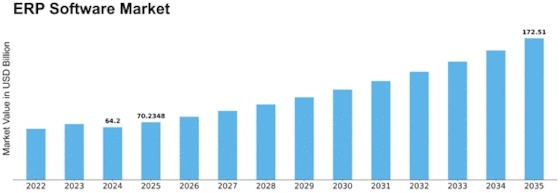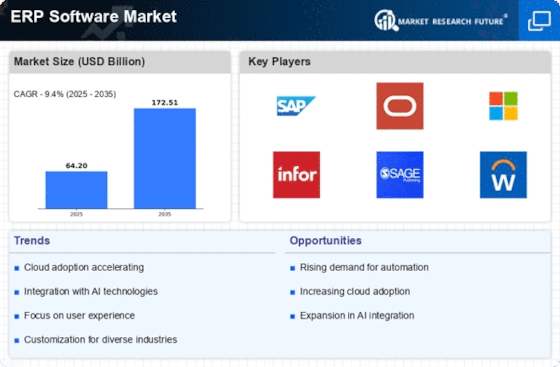On-Premises
Cloud-Based
Hybrid
Small Enterprises
Medium Enterprises
Large Enterprises
Financial Management
Supply Chain Management
Human Resource Management
Customer Relationship Management
Manufacturing
Retail
Healthcare
Education
North America
Europe
South America
Asia Pacific
Middle East and Africa
North America Outlook (USD Billion, 2019-2035)
North America ERP Software Market by Deployment Model Type
On-Premises
Cloud-Based
Hybrid
North America ERP Software Market by Business Size Type
Small Enterprises
Medium Enterprises
Large Enterprises
North America ERP Software Market by Functionality Type
Financial Management
Supply Chain Management
Human Resource Management
Customer Relationship Management
North America ERP Software Market by Industry Type
Manufacturing
Retail
Healthcare
Education
North America ERP Software Market by Regional Type
US
Canada
US Outlook (USD Billion, 2019-2035)
US ERP Software Market by Deployment Model Type
On-Premises
Cloud-Based
Hybrid
US ERP Software Market by Business Size Type
Small Enterprises
Medium Enterprises
Large Enterprises
US ERP Software Market by Functionality Type
Financial Management
Supply Chain Management
Human Resource Management
Customer Relationship Management
US ERP Software Market by Industry Type
Manufacturing
Retail
Healthcare
Education
CANADA Outlook (USD Billion, 2019-2035)
CANADA ERP Software Market by Deployment Model Type
On-Premises
Cloud-Based
Hybrid
CANADA ERP Software Market by Business Size Type
Small Enterprises
Medium Enterprises
Large Enterprises
CANADA ERP Software Market by Functionality Type
Financial Management
Supply Chain Management
Human Resource Management
Customer Relationship Management
CANADA ERP Software Market by Industry Type
Manufacturing
Retail
Healthcare
Education
Europe Outlook (USD Billion, 2019-2035)
Europe ERP Software Market by Deployment Model Type
On-Premises
Cloud-Based
Hybrid
Europe ERP Software Market by Business Size Type
Small Enterprises
Medium Enterprises
Large Enterprises
Europe ERP Software Market by Functionality Type
Financial Management
Supply Chain Management
Human Resource Management
Customer Relationship Management
Europe ERP Software Market by Industry Type
Manufacturing
Retail
Healthcare
Education
Europe ERP Software Market by Regional Type
Germany
UK
France
Russia
Italy
Spain
Rest of Europe
GERMANY Outlook (USD Billion, 2019-2035)
GERMANY ERP Software Market by Deployment Model Type
On-Premises
Cloud-Based
Hybrid
GERMANY ERP Software Market by Business Size Type
Small Enterprises
Medium Enterprises
Large Enterprises
GERMANY ERP Software Market by Functionality Type
Financial Management
Supply Chain Management
Human Resource Management
Customer Relationship Management
GERMANY ERP Software Market by Industry Type
Manufacturing
Retail
Healthcare
Education
UK Outlook (USD Billion, 2019-2035)
UK ERP Software Market by Deployment Model Type
On-Premises
Cloud-Based
Hybrid
UK ERP Software Market by Business Size Type
Small Enterprises
Medium Enterprises
Large Enterprises
UK ERP Software Market by Functionality Type
Financial Management
Supply Chain Management
Human Resource Management
Customer Relationship Management
UK ERP Software Market by Industry Type
Manufacturing
Retail
Healthcare
Education
FRANCE Outlook (USD Billion, 2019-2035)
FRANCE ERP Software Market by Deployment Model Type
On-Premises
Cloud-Based
Hybrid
FRANCE ERP Software Market by Business Size Type
Small Enterprises
Medium Enterprises
Large Enterprises
FRANCE ERP Software Market by Functionality Type
Financial Management
Supply Chain Management
Human Resource Management
Customer Relationship Management
FRANCE ERP Software Market by Industry Type
Manufacturing
Retail
Healthcare
Education
RUSSIA Outlook (USD Billion, 2019-2035)
RUSSIA ERP Software Market by Deployment Model Type
On-Premises
Cloud-Based
Hybrid
RUSSIA ERP Software Market by Business Size Type
Small Enterprises
Medium Enterprises
Large Enterprises
RUSSIA ERP Software Market by Functionality Type
Financial Management
Supply Chain Management
Human Resource Management
Customer Relationship Management
RUSSIA ERP Software Market by Industry Type
Manufacturing
Retail
Healthcare
Education
ITALY Outlook (USD Billion, 2019-2035)
ITALY ERP Software Market by Deployment Model Type
On-Premises
Cloud-Based
Hybrid
ITALY ERP Software Market by Business Size Type
Small Enterprises
Medium Enterprises
Large Enterprises
ITALY ERP Software Market by Functionality Type
Financial Management
Supply Chain Management
Human Resource Management
Customer Relationship Management
ITALY ERP Software Market by Industry Type
Manufacturing
Retail
Healthcare
Education
SPAIN Outlook (USD Billion, 2019-2035)
SPAIN ERP Software Market by Deployment Model Type
On-Premises
Cloud-Based
Hybrid
SPAIN ERP Software Market by Business Size Type
Small Enterprises
Medium Enterprises
Large Enterprises
SPAIN ERP Software Market by Functionality Type
Financial Management
Supply Chain Management
Human Resource Management
Customer Relationship Management
SPAIN ERP Software Market by Industry Type
Manufacturing
Retail
Healthcare
Education
REST OF EUROPE Outlook (USD Billion, 2019-2035)
REST OF EUROPE ERP Software Market by Deployment Model Type
On-Premises
Cloud-Based
Hybrid
REST OF EUROPE ERP Software Market by Business Size Type
Small Enterprises
Medium Enterprises
Large Enterprises
REST OF EUROPE ERP Software Market by Functionality Type
Financial Management
Supply Chain Management
Human Resource Management
Customer Relationship Management
REST OF EUROPE ERP Software Market by Industry Type
Manufacturing
Retail
Healthcare
Education
APAC Outlook (USD Billion, 2019-2035)
APAC ERP Software Market by Deployment Model Type
On-Premises
Cloud-Based
Hybrid
APAC ERP Software Market by Business Size Type
Small Enterprises
Medium Enterprises
Large Enterprises
APAC ERP Software Market by Functionality Type
Financial Management
Supply Chain Management
Human Resource Management
Customer Relationship Management
APAC ERP Software Market by Industry Type
Manufacturing
Retail
Healthcare
Education
APAC ERP Software Market by Regional Type
China
India
Japan
South Korea
Malaysia
Thailand
Indonesia
Rest of APAC
CHINA Outlook (USD Billion, 2019-2035)
CHINA ERP Software Market by Deployment Model Type
On-Premises
Cloud-Based
Hybrid
CHINA ERP Software Market by Business Size Type
Small Enterprises
Medium Enterprises
Large Enterprises
CHINA ERP Software Market by Functionality Type
Financial Management
Supply Chain Management
Human Resource Management
Customer Relationship Management
CHINA ERP Software Market by Industry Type
Manufacturing
Retail
Healthcare
Education
INDIA Outlook (USD Billion, 2019-2035)
INDIA ERP Software Market by Deployment Model Type
On-Premises
Cloud-Based
Hybrid
INDIA ERP Software Market by Business Size Type
Small Enterprises
Medium Enterprises
Large Enterprises
INDIA ERP Software Market by Functionality Type
Financial Management
Supply Chain Management
Human Resource Management
Customer Relationship Management
INDIA ERP Software Market by Industry Type
Manufacturing
Retail
Healthcare
Education
JAPAN Outlook (USD Billion, 2019-2035)
JAPAN ERP Software Market by Deployment Model Type
On-Premises
Cloud-Based
Hybrid
JAPAN ERP Software Market by Business Size Type
Small Enterprises
Medium Enterprises
Large Enterprises
JAPAN ERP Software Market by Functionality Type
Financial Management
Supply Chain Management
Human Resource Management
Customer Relationship Management
JAPAN ERP Software Market by Industry Type
Manufacturing
Retail
Healthcare
Education
SOUTH KOREA Outlook (USD Billion, 2019-2035)
SOUTH KOREA ERP Software Market by Deployment Model Type
On-Premises
Cloud-Based
Hybrid
SOUTH KOREA ERP Software Market by Business Size Type
Small Enterprises
Medium Enterprises
Large Enterprises
SOUTH KOREA ERP Software Market by Functionality Type
Financial Management
Supply Chain Management
Human Resource Management
Customer Relationship Management
SOUTH KOREA ERP Software Market by Industry Type
Manufacturing
Retail
Healthcare
Education
MALAYSIA Outlook (USD Billion, 2019-2035)
MALAYSIA ERP Software Market by Deployment Model Type
On-Premises
Cloud-Based
Hybrid
MALAYSIA ERP Software Market by Business Size Type
Small Enterprises
Medium Enterprises
Large Enterprises
MALAYSIA ERP Software Market by Functionality Type
Financial Management
Supply Chain Management
Human Resource Management
Customer Relationship Management
MALAYSIA ERP Software Market by Industry Type
Manufacturing
Retail
Healthcare
Education
THAILAND Outlook (USD Billion, 2019-2035)
THAILAND ERP Software Market by Deployment Model Type
On-Premises
Cloud-Based
Hybrid
THAILAND ERP Software Market by Business Size Type
Small Enterprises
Medium Enterprises
Large Enterprises
THAILAND ERP Software Market by Functionality Type
Financial Management
Supply Chain Management
Human Resource Management
Customer Relationship Management
THAILAND ERP Software Market by Industry Type
Manufacturing
Retail
Healthcare
Education
INDONESIA Outlook (USD Billion, 2019-2035)
INDONESIA ERP Software Market by Deployment Model Type
On-Premises
Cloud-Based
Hybrid
INDONESIA ERP Software Market by Business Size Type
Small Enterprises
Medium Enterprises
Large Enterprises
INDONESIA ERP Software Market by Functionality Type
Financial Management
Supply Chain Management
Human Resource Management
Customer Relationship Management
INDONESIA ERP Software Market by Industry Type
Manufacturing
Retail
Healthcare
Education
REST OF APAC Outlook (USD Billion, 2019-2035)
REST OF APAC ERP Software Market by Deployment Model Type
On-Premises
Cloud-Based
Hybrid
REST OF APAC ERP Software Market by Business Size Type
Small Enterprises
Medium Enterprises
Large Enterprises
REST OF APAC ERP Software Market by Functionality Type
Financial Management
Supply Chain Management
Human Resource Management
Customer Relationship Management
REST OF APAC ERP Software Market by Industry Type
Manufacturing
Retail
Healthcare
Education
South America Outlook (USD Billion, 2019-2035)
South America ERP Software Market by Deployment Model Type
On-Premises
Cloud-Based
Hybrid
South America ERP Software Market by Business Size Type
Small Enterprises
Medium Enterprises
Large Enterprises
South America ERP Software Market by Functionality Type
Financial Management
Supply Chain Management
Human Resource Management
Customer Relationship Management
South America ERP Software Market by Industry Type
Manufacturing
Retail
Healthcare
Education
South America ERP Software Market by Regional Type
Brazil
Mexico
Argentina
Rest of South America
BRAZIL Outlook (USD Billion, 2019-2035)
BRAZIL ERP Software Market by Deployment Model Type
On-Premises
Cloud-Based
Hybrid
BRAZIL ERP Software Market by Business Size Type
Small Enterprises
Medium Enterprises
Large Enterprises
BRAZIL ERP Software Market by Functionality Type
Financial Management
Supply Chain Management
Human Resource Management
Customer Relationship Management
BRAZIL ERP Software Market by Industry Type
Manufacturing
Retail
Healthcare
Education
MEXICO Outlook (USD Billion, 2019-2035)
MEXICO ERP Software Market by Deployment Model Type
On-Premises
Cloud-Based
Hybrid
MEXICO ERP Software Market by Business Size Type
Small Enterprises
Medium Enterprises
Large Enterprises
MEXICO ERP Software Market by Functionality Type
Financial Management
Supply Chain Management
Human Resource Management
Customer Relationship Management
MEXICO ERP Software Market by Industry Type
Manufacturing
Retail
Healthcare
Education
ARGENTINA Outlook (USD Billion, 2019-2035)
ARGENTINA ERP Software Market by Deployment Model Type
On-Premises
Cloud-Based
Hybrid
ARGENTINA ERP Software Market by Business Size Type
Small Enterprises
Medium Enterprises
Large Enterprises
ARGENTINA ERP Software Market by Functionality Type
Financial Management
Supply Chain Management
Human Resource Management
Customer Relationship Management
ARGENTINA ERP Software Market by Industry Type
Manufacturing
Retail
Healthcare
Education
REST OF SOUTH AMERICA Outlook (USD Billion, 2019-2035)
REST OF SOUTH AMERICA ERP Software Market by Deployment Model Type
On-Premises
Cloud-Based
Hybrid
REST OF SOUTH AMERICA ERP Software Market by Business Size Type
Small Enterprises
Medium Enterprises
Large Enterprises
REST OF SOUTH AMERICA ERP Software Market by Functionality Type
Financial Management
Supply Chain Management
Human Resource Management
Customer Relationship Management
REST OF SOUTH AMERICA ERP Software Market by Industry Type
Manufacturing
Retail
Healthcare
Education
MEA Outlook (USD Billion, 2019-2035)
MEA ERP Software Market by Deployment Model Type
On-Premises
Cloud-Based
Hybrid
MEA ERP Software Market by Business Size Type
Small Enterprises
Medium Enterprises
Large Enterprises
MEA ERP Software Market by Functionality Type
Financial Management
Supply Chain Management
Human Resource Management
Customer Relationship Management
MEA ERP Software Market by Industry Type
Manufacturing
Retail
Healthcare
Education
MEA ERP Software Market by Regional Type
GCC Countries
South Africa
Rest of MEA
GCC COUNTRIES Outlook (USD Billion, 2019-2035)
GCC COUNTRIES ERP Software Market by Deployment Model Type
On-Premises
Cloud-Based
Hybrid
GCC COUNTRIES ERP Software Market by Business Size Type
Small Enterprises
Medium Enterprises
Large Enterprises
GCC COUNTRIES ERP Software Market by Functionality Type
Financial Management
Supply Chain Management
Human Resource Management
Customer Relationship Management
GCC COUNTRIES ERP Software Market by Industry Type
Manufacturing
Retail
Healthcare
Education
SOUTH AFRICA Outlook (USD Billion, 2019-2035)
SOUTH AFRICA ERP Software Market by Deployment Model Type
On-Premises
Cloud-Based
Hybrid
SOUTH AFRICA ERP Software Market by Business Size Type
Small Enterprises
Medium Enterprises
Large Enterprises
SOUTH AFRICA ERP Software Market by Functionality Type
Financial Management
Supply Chain Management
Human Resource Management
Customer Relationship Management
SOUTH AFRICA ERP Software Market by Industry Type
Manufacturing
Retail
Healthcare
Education
REST OF MEA Outlook (USD Billion, 2019-2035)
REST OF MEA ERP Software Market by Deployment Model Type
On-Premises
Cloud-Based
Hybrid
REST OF MEA ERP Software Market by Business Size Type
Small Enterprises
Medium Enterprises
Large Enterprises
REST OF MEA ERP Software Market by Functionality Type
Financial Management
Supply Chain Management
Human Resource Management
Customer Relationship Management
REST OF MEA ERP Software Market by Industry Type
Manufacturing
Retail
Healthcare
Education



















Leave a Comment